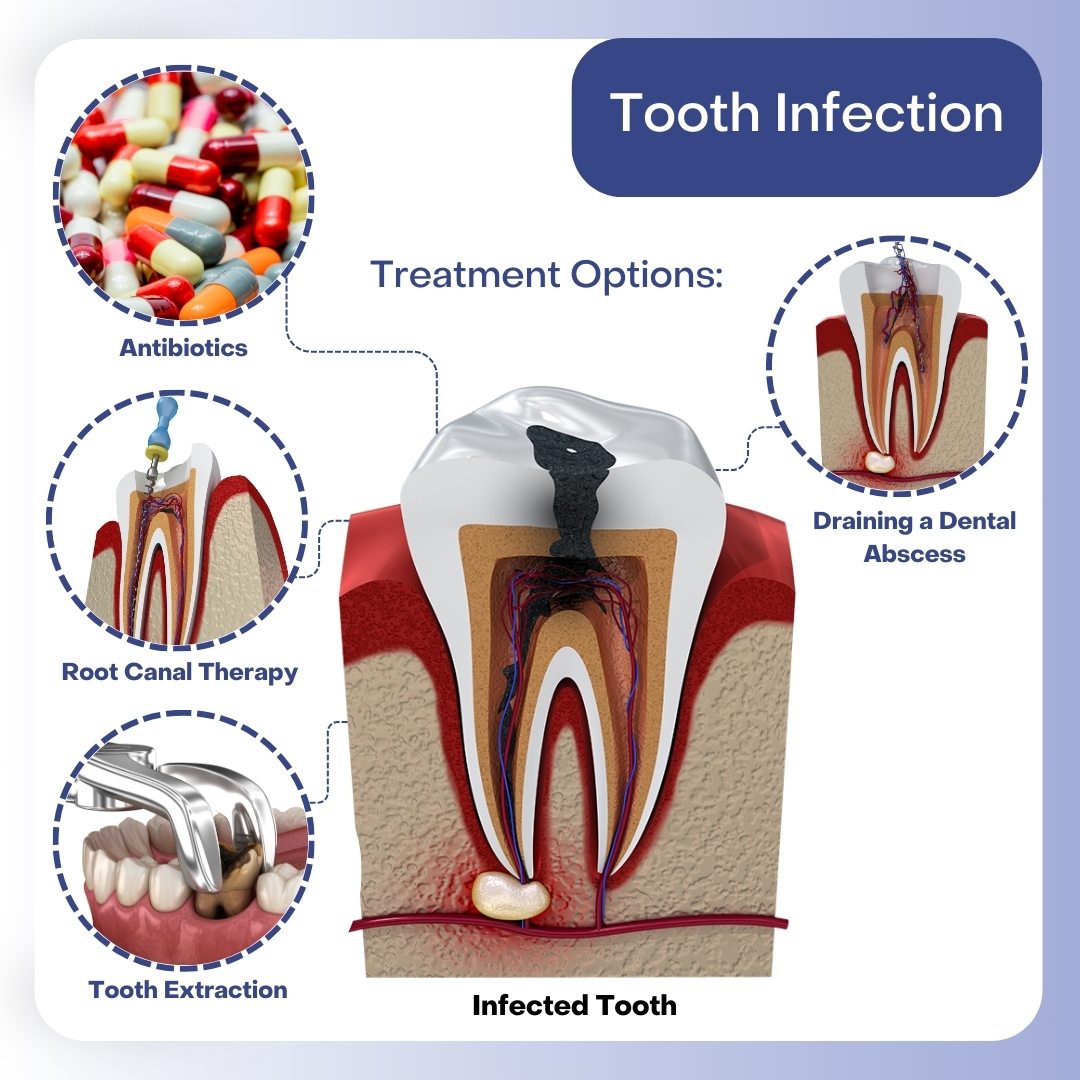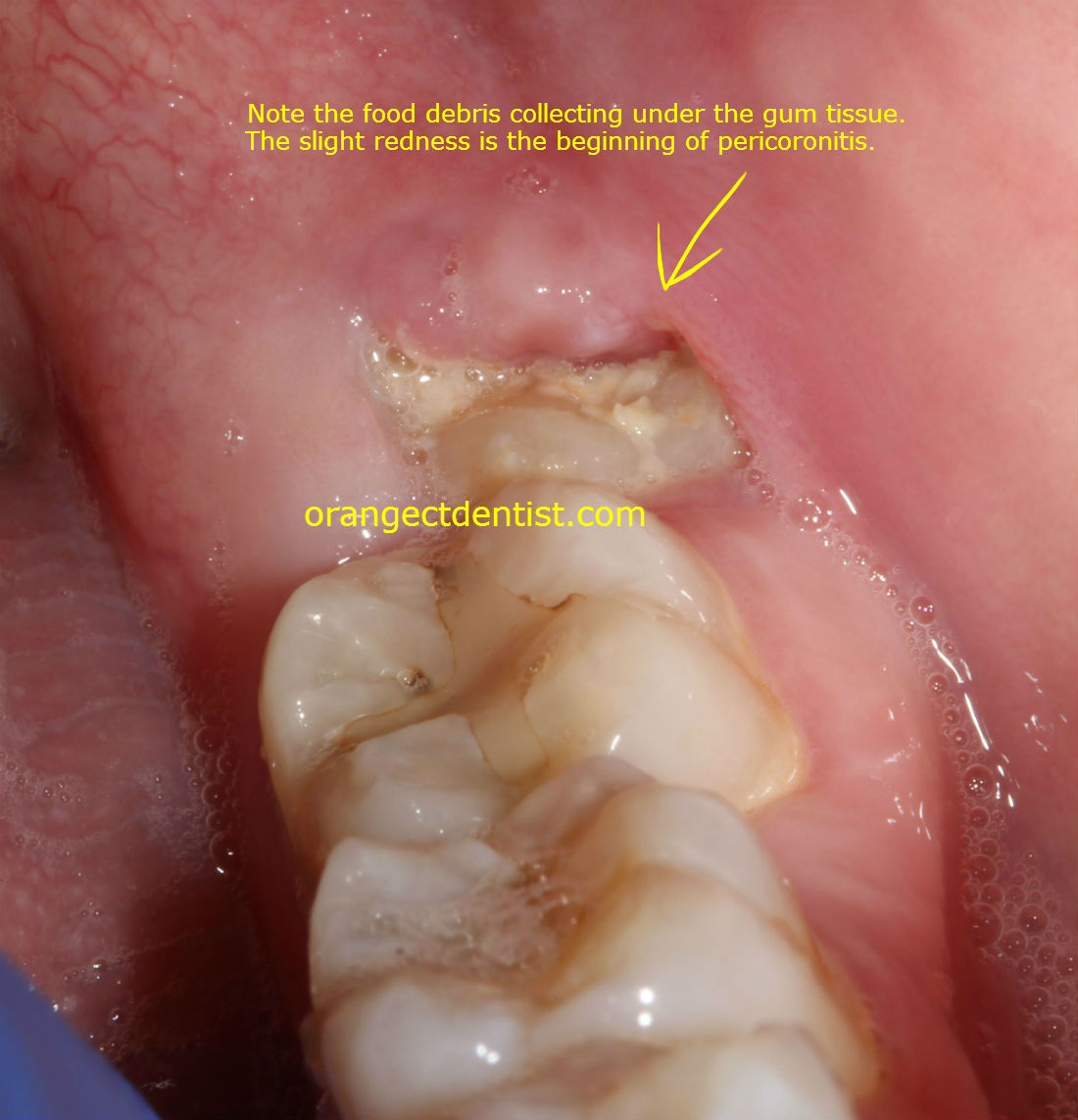An infected wisdom tooth can lead to pain and serious complications. Immediate dental consultation is necessary to address the infection.
Experiencing discomfort at the back of your mouth could signal a common dental issue—an infected wisdom tooth. Known as third molars, wisdom teeth are the last to emerge and often lack the necessary space to grow properly, making them prone to infection.
Symptoms like swelling, pain, and difficulty opening your mouth shouldn’t be ignored, as they can indicate an infection that might spread or worsen if left untreated. Seeking prompt dental care is crucial for alleviating pain and preventing further oral health problems. Our oral hygiene and health can significantly impact our overall well-being, making it vital to stay informed about issues like wisdom tooth infections and how to handle them effectively.
Introduction To Wisdom Tooth Infections
Wisdom tooth infections can cause pain and swelling. They occur when the third molars, also known as wisdom teeth, cannot properly emerge or clean. This introduction covers what wisdom teeth are and common infection causes.
What Are Wisdom Teeth?
Wisdom teeth are the last set of molars. Most people get them in their late teens or early twenties. These teeth can be a valuable asset when healthy and properly aligned. However, they often are misaligned and require removal.
Common Causes Of Infection
Infections in wisdom teeth, also known as pericoronitis, happen for several reasons:
- Impacted teeth not emerging fully
- Trapped food and bacteria causing decay
- Difficulties in cleaning hard-to-reach areas
- Gum disease around the wisdom tooth

Credit: mynjdentist.com
Recognizing The Symptoms
Wisdom teeth can cause trouble. They are the last to join the party in your mouth, often leading to pain and infection. Recognizing the symptoms early can help prevent more serious issues. Let’s dive into the key signs that your wisdom tooth might be infected.
Pain And Discomfort
Pain is the most common sign of a wisdom tooth infection. It can range from mild to severe and often gets worse when eating or at night. You might feel the pain not just in your tooth, but also in your jaw, ear, or even your throat. Breaking the pain down:
- Sharp pain when biting down or chewing.
- Throbbing pain in the jaw area.
- Sudden pain spikes at night.
Swelling And Redness
Infection often leads to swelling and redness around the affected area. This swelling can make your jaw look puffier than usual. The gums around the wisdom tooth might also appear red and feel tender. To better understand:
| Area | Symptoms |
|---|---|
| Jaw | Visible swelling, making the face look asymmetrical |
| Gums | Redness, tenderness, and sometimes bleeding |
Difficulty Chewing And Swallowing
Infected wisdom teeth can make chewing and swallowing a painful task. You might find yourself avoiding food or favoring one side of your mouth. The pain can also lead to difficulty opening your mouth wide, affecting how you eat and speak. Key points include:
- Pain while chewing on the affected side.
- Swallowing feels uncomfortable or painful.
- Limited mouth opening, affecting speech and eating.
When To Seek Dental Advice
Teeth are tough, but sometimes they need help. A wisdom tooth infection can be serious. Knowing when to get dental advice is crucial. Let’s explore the signs that it’s time to see a dentist.
Severity Of Symptoms
Watch for red flags with an infected wisdom tooth. These include:
- Swelling in the gums or jaw
- Pain that disrupts daily activities
- Bad taste in the mouth or bad breath
- Fever indicating body fights infection
Prolonged Discomfort
Don’t ignore pain that lasts. If discomfort persists for more than a couple of days, it’s time to call the dentist.
Home Remedies: When They Aren’t Enough
Simple home treatments can offer relief, but they may not always be enough. Use remedies like:
- Saltwater rinse to reduce bacteria
- Cold compress for swelling
- Clove oil for pain relief
When symptoms continue despite home care, professional dental help is needed.
Diagnosis Of Infected Wisdom Tooth
The road to relief from wisdom tooth pain begins with a proper diagnosis. Recognizing infection signs is crucial. Throbbing pain, swollen gums, or a bad taste in your mouth can signal an infected wisdom tooth. Let’s explore how dentists pinpoint the issue.
Dental Examination
A thorough check-up is step one. Your dentist will look for redness, swelling, and pus. They’ll also ask about your pain. This helps them understand your condition better.
- Gum inspection: Checks for signs of infection.
- Teeth assessment: Ensures no other teeth are affected.
- Pain evaluation: Determines the pain’s severity and source.
Imaging Techniques
Images give a clearer picture of what’s happening below the surface. X-rays can show if the tooth is impacted or if the infection has spread. In some cases, a CT scan might be needed.
| Imaging Type | Purpose |
|---|---|
| X-ray | Reveals tooth position and infection spread. |
| CT scan | Provides detailed images of bone and soft tissues. |
With these tools, dentists can craft a targeted treatment plan. A clear diagnosis means faster pain relief and recovery.
Professional Treatment Options
When a wisdom tooth gets infected, it hurts a lot. You might feel pain and swelling. It’s important to see a dentist. They know the best ways to help. Here are some treatments they might suggest.
Antibiotics
First, your dentist might give you medicine. This medicine is called antibiotics. It fights the germs making your tooth hurt. You need to take it as the dentist says.
Procedure For Drainage
Sometimes, there’s pus where it hurts. The dentist can help by making a small cut to let it out. This is called drainage. It makes the swelling go down and helps you feel better.
Wisdom Tooth Extraction
If your tooth keeps hurting, it might need to come out. This is called extraction. The dentist will make sure you don’t feel pain during this. After, you need to rest and eat soft food for a few days.
| Treatment | What it does | Next steps |
|---|---|---|
| Antibiotics | Fights germs | Take as prescribed |
| Drainage | Lets out pus | Swelling goes down |
| Extraction | Removes tooth | Rest, eat soft food |
Recovery And Aftercare
When a wisdom tooth gets infected, proper recovery and aftercare are crucial. These steps help ensure healing. They also prevent further complications. Let’s explore the essentials of aftercare following wisdom tooth infection surgery.
Post-surgical Care
Keep the area clean to avoid infection. Use saltwater rinses after meals. This helps to remove food particles. Rest is key for the first 24 hours. Avoid strenuous activities for a few days. Change gauze pads as instructed by your dentist.
Pain Management
After surgery, managing pain is important. Use ice packs on the cheek to reduce swelling. Follow your dentist’s advice for taking pain relievers. Don’t wait for pain to become intense before using medication.
Dietary Adjustments
Right after surgery, stick to soft foods. Examples include yogurt, applesauce, and smoothies. Drink plenty of fluids but avoid using a straw. Sucking motions can dislodge the blood clot. Gradually reintroduce solid foods as healing progresses.
Preventing Future Infections
Wisdom tooth infections can be painful. To avoid them, good habits are key.
Oral Hygiene Best Practices
Brush teeth twice daily to remove food and bacteria.
Use fluoride toothpaste for strong enamel and protection.
Don’t forget to floss once a day. It clears hidden plaque.
Rinse with an antiseptic mouthwash to kill lingering germs.
- Choose soft bristles for your toothbrush.
- Change your toothbrush every three months.
Regular Dental Check-ups
Visit your dentist every six months for a check-up.
Professional cleanings remove tartar build-up.
Dentists spot early signs of infection or tooth issues.
They provide tailored advice for your oral health.
Schedule immediate visits if pain or swelling occurs.

Credit: www.sleepdentistrybrisbane.com.au
Complications Of Untreated Infections
An infected wisdom tooth can lead to serious problems. Ignoring the infection invites greater risks. Patients should seek prompt dental care. Here are the complications associated with untreated infections.
Potential For Cyst Formation
Wisdom teeth can develop cysts. These are fluid-filled sacs. They damage the jawbone, teeth, and nerves. Early treatment prevents cysts from forming.
Risk Of Systemic Infection
A local infection can spread. It becomes a systemic infection. This affects the entire body. Symptoms include fever, swelling, and pain. Immediate medical attention is necessary.
| Complication | Consequence | Treatment |
|---|---|---|
| Cyst Formation | Damages surrounding structures | Surgical removal |
| Systemic Infection | Affects overall health | Antibiotics or hospitalization |
- Regular dental check-ups prevent complications.
- Good oral hygiene reduces infection risks.
- Early intervention avoids severe outcomes.
Act fast if you suspect an infection. Your health depends on it.

Credit: orangectdentist.com
Frequently Asked Questions
What Are Symptoms Of An Infected Wisdom Tooth?
Swollen gums, pain, difficulty chewing, and a foul taste indicate a wisdom tooth infection.
How Is Wisdom Tooth Infection Treated?
Treatment often includes antibiotics, pain relief, and potentially tooth extraction by a dental professional.
Can Wisdom Tooth Infection Cause Complications?
Untreated infections can lead to cysts, abscesses, and systemic health issues.
How Can I Prevent Wisdom Tooth Infections?
Maintain good oral hygiene, regular dental checkups, and discuss preventive measures with your dentist.
Is Wisdom Tooth Removal Always Necessary?
Not always; it depends on the severity of the infection and the tooth’s impact on surrounding teeth and gums.
Conclusion
Dealing with an infected wisdom tooth requires timely and proper care. Ignoring symptoms can lead to more severe issues. Remember, early consultation with a dentist is crucial for effective treatment. Maintaining oral hygiene and regular check-ups are your best defense against future infections.
Take action now for a healthier smile tomorrow.
